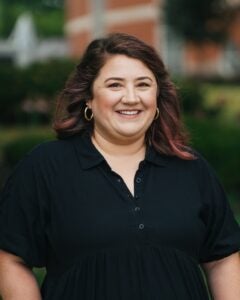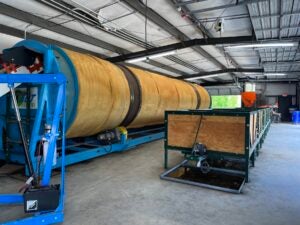Starcher-Patton returned to Marshall in 2019 as an instructor and helped develop the undergraduate Specialty Agriculture program that launched in the fall 2022 semester. She now works as an assistant professor in the program.
A market research report was done on students in a 100-mile radius of Marshall’s Huntington campus, indicating a growth in labor demand for specialty agriculture.

The program is designed to teach about high-yield agriculture that can be economically sustainable in mountainous regions and small land areas like we see in Appalachia. The program will not only benefit the graduates, but also the region as better agricultural practices can lead to the development of a healthy, sustainable food supply for the region.
“The focus with many of our classes is based on what’s going to work here regionally, because the whole idea was what best serves our students,” Starcher-Patton said.
Although the program is housed in the College of Science, students benefit from courses taught in a variety of academic colleges and departments, including education and business.

In 2023, Marshall opened the first commercial composting facility in the state of West Virginia, which is a great feat, considering Marshall is a non-land-grant institution.
Originally established under the federal Morrill Acts of 1862 and 1890, land-grant institutions are designated to receive federal land or funding to focus on teaching, research and outreach in the fields of agriculture, science and engineering.
While Marshall University is not a land-grant institution, faculty like Starcher-Patton are breaking new ground in agricultural education by introducing innovative courses and programs tailored to the region’s unique needs. Marshall was formally classified by the USDA as a non-land college of agriculture (NLGCA) in 2020 after the launch of the speciality agriculture major in 2020.
Starcher-Patton is passionate about soil science, and in fall 2022 she taught the first-ever soil science class offered at Marshall.
She is currently working on a $150,000 Capacity Building Grant from the USDA National Institute of Food and Agriculture titled, “Agriculture and Natural Resources Microcredentials to Support Workforce Development in Southwestern West Virginia.”
The grant has allowed her to interview employers in agriculture and natural resources in the Tri-State area to identify the skills and knowledge they need employees to have. The information gained from this grant provided insight on how to direct the future of the academic program, helping professors shape content for what the workforce needs.
Beyond helping the local agricultural workforce and her students, Starcher-Patton also extended her advice for sustainable food practices as we approach the Thanksgiving holiday.
- Shop local
The food at local grocery stores, markets and roadside stands are typically picked at their peak freshness, giving them less time to sit on the shelf, be treated, and are more nutrient dense.
- Select heirloom varieties of fruits and vegetables
Heirloom varieties are open-pollinated, which means they have been grown for generations in the region and have adapted to the climate, pests and soil.
“In our crop production, when you have more varieties of crops grown, you have more security in that system,” Starcher-Patton said. “Say, there’s a pest or pathogen that comes along and it wipes out a whole variety. We’ve got 300 varieties that we still can lean on.”
- Soil test now
Even if you don’t garden, Starcher-Patton recommends this time of year is great for soil testing. Soils tests are helpful for determining what fertilizers to make the grass on your lawn grow better and are key to preventing over-fertilization which can have harmful environmental effects. West Virginia residents can get their soil tested for free by the West Virginia University Extension Service.
- No-Till November
If you’re growing your own food in a large or household garden, the Natural Resources Conservation Service (NRCS) encourages farmers to participate in “No-Till November” to help preserve soil quality. Leaving the “stubble” of plants, including their roots, helps reduce soil erosion, supports biodiversity in microorganisms, and improves soil structure over time.
For students looking at joining the specialty agriculture program at Marshall, there is a student-run agriculture club lovingly called “The Crop Circle.” Starcher-Patton also helps students run a garden club and a collegiate 4-H club.
“If anyone wants to join our major, you get a lot of individualized attention right now because we’re still growing,” she said.
Information on the Specialty Agriculture program at Marshall can be found at www.marshall.edu/nre/specialty-agriculture.





